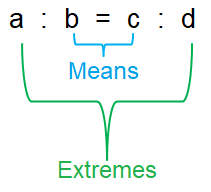WORD PROBLEMS ON PROPORTIONS
Subscribe to our ▶️ YouTube channel 🔴 for the latest videos, updates, and tips.
Definition of proportion :
Proportion is an equation that defines that the two given ratios are equivalent to each other.
In other words, the proportion states the equality of the two fractions or the ratios.
Proportions are denoted by the symbol '::' or '='.
In proportion,
The two ratios are a : b & c : d.

Cross Product Rule :
Product of extremes = Product of means
ad = bc
Problem 1 :
A car travels 120 miles in 3 hours (with a constant speed). How far will it take to travel 200 miles?
Solution :
The ratio between distance traveled and number of hours is
120 : 3 -----> (1)
Let 'x' be the number of hours for 200 miles.
Then,
200 : x ----->(2)
From (1) and (2), we get
120 : 3 = 200 : x
120/3 = 200/x
By cross multiply,
120(x) = 200(3)
120(x) = 600
Divide each side by 120.
x = 600/120
x = 5
It takes to travel 5 hours for 200 miles.
Problem 2 :
50 apples cost $25. How much would 75 apples cost?
Solution :
The ratio between the number of apples and the cost is
50 : 25 ----->(1)
Let ‘x’ be the cost of 75 apples.
Then,
75 : x ----->(2)
From (1) and (2), we get
50 : 25 = 75 : x
50(x) = 75(25)
50x = 1875
Divide each side by 50.
x = 1875/50
x = 37.5
So, the cost of 75 apples is $37.5.
Problem 3 :
It takes Mike18 minutes to finish reading 4 pages of a book. How long does it take for him to finish reading 30 pages?
Solution :
The ratio between the number of minutes and number of pages to finish reading a book is
18 : 4 ----->(1)
Let ‘x’ be the number of minutes to read 30 pages.
Then,
x : 30 ----->(2)
From (1) and (2), we get
18 : 4 = x : 30
18(30) = x(4)
540 = 4x
Divide each side by 4.
540/4 = x
x = 135
It takes 135 minutes to read 30 pages.
Problem 4 :
Nathan packs 25 boxes in 2 hours. How many boxes can he pack in his 8 – hour shift?
Solution :
The ratio between number of boxes and time taken
= 25 : 2 ----->(1)
Let ‘x’ be the number of boxes pack in 8 hours.
Then,
= x : 8 ----->(2)
From (1) and (2), we get
25 : 2 = x : 8
25(8) = x(2)
200 = 2x
Divide each side by 2.
200/2 = x
x = 100
So, Nathan packs 100 boxes in 8 hours.
Problem 5 :
13 candy bars weigh 26 ounces. What is the weight of 35 candy bars?
Solution :
The ratio between the number of candy bars and the weigh of ounces is
13 : 26 -----> (1)
Let ‘x’ be the weight of 35 candy bars.
Then,
35 : x ----->(2)
From (1) and (2), we get
13 : 26 = 35 : x
13(x) = 35(26)
13x = 910
Divide each side by 13.
x = 910/13
x = 70
So, the weight of 35 candy bars is 70 ounces.
Problem 6 :
A machine can produce 6 yards of fabric in 2 minutes. How much fabric can the machine produce in 1 hour?
Solution :
The ratio between the number of yards of fabric and time taken is
6 : 2 -----> (1)
Let ‘x’ be the number of yards of fabric in 1 hour.
Then,
1 hour = 60 minutes
x : 60 -----> (2)
From (1) and (2) we get
6 : 2 = x : 60
6/2 = x/60
6(60) = x(2)
360 = 2x
Divide each side by 2.
360/2 = x
180 = x
So, the machine can produce 180 yards of fabric in 1 hour.
Problem 7 :
24 loaves of bread cost $48. How much does 10 loaves cost?
Solution :
The ratio between the number of loaves and the bread cost is
24 : 48 ---->(1)
Let ‘x’ be the cost of 10 loaves.
Then,
10 : x -----> (2)
From (1) and (2),
24 : 48 = 10 : x
24/48 = 10/x
24(x) = 10(48)
24x = 480
Divide each side by 24.
x = 480/24
x = 20
So, the cost of 10 loaves is $20.
Problem 8 :
You are making sugar water for your hummingbird feeder. A website indicates to use 4 parts of water for every 1 part of sugar. You use 20 cups of water. How much sugar do you need?
Solution :
Preparation of sugar water needs 4 cups of water to 1 cup of sugar. The ratio is,
= 4 : 1
Let x be the number of cups of sugar needed for 20 cups of sugar.
4 : 1 = 20 : x
4/1 = 20/x
4x = 20
x = 20/4
x = 5
So, 5 cups of sugar is needed.
Subscribe to our ▶️ YouTube channel 🔴 for the latest videos, updates, and tips.
Recent Articles
-
Finding Range of Values Inequality Problems
May 21, 24 08:51 PM
Finding Range of Values Inequality Problems -
Solving Two Step Inequality Word Problems
May 21, 24 08:51 AM
Solving Two Step Inequality Word Problems -
Exponential Function Context and Data Modeling
May 20, 24 10:45 PM
Exponential Function Context and Data Modeling